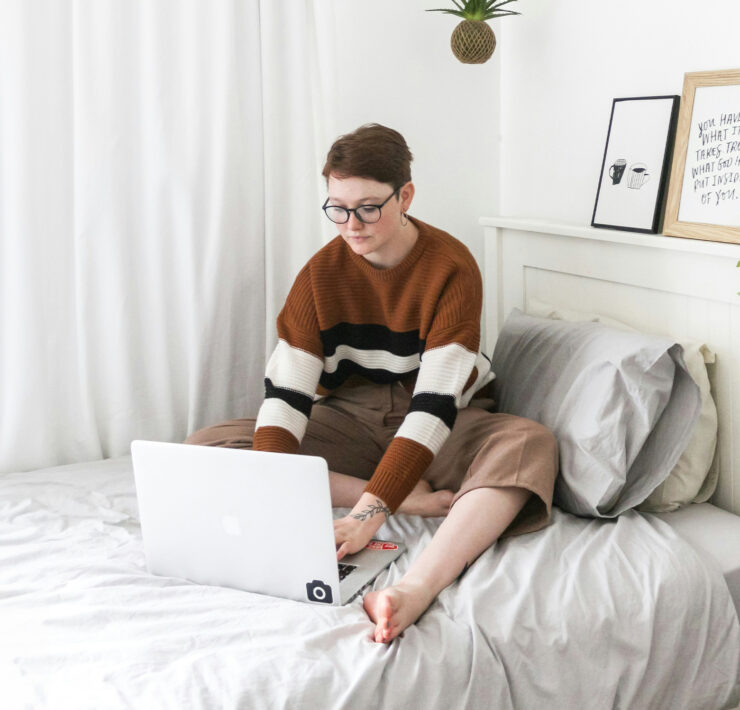I couldn’t tell you what time it was when I stirred. There was no electricity. No heat. No plumbing. No street lights. It was pitch black. And it was eerie.
But I had to go to the bathroom. I tried to will the feeling away, but no matter what I did it stuck around. I rolled out of my sleeping bag and my feet hit the cold floor. The fire we had started the night before to keep us warm was out by now.
I put on my jacket, zipped it all the way up to my chin, grabbed the door handle of the cabin, and peeked my head outside. That’s when I began yelling.
“Hey, bear! Hey, bear! Hey bear!”
When I didn’t hear anything, I grabbed the protective shotgun we kept just inside the threshold and started making my way 50 yards up the hill to the outhouse. The only light was the stars up above and my dinky flashlight. Every few steps I repeated the mantra I had gotten so used to shouting during the week: “Hey, bear!”
I repeated the process on my return walk to the remote Alaskan cabin that me and my two buddies were using for the week – a cabin that served as home base for the fishing trip of a lifetime right smack dab in the middle of bear country.
Why do I tell you all that? Because as someone with diagnosed anxiety and OCD, I learned something important on that trip: anxiety isn’t always a bad thing.
I was diagnosed with anxiety and OCD in 2014. Growing up, I always knew something was “different” about me. I couldn’t “just get over it,” whatever “it” was. Maybe it was a comment from someone, the thought of another “what if?”, or even an email that I had to re-read 50 times (no exaggeration).
For much of my life, my mind was trapped in endless thought cycles like a dog chasing its tail. Only that dog probably was more successful than I was in ending the madness.
I grew up in an evangelical tradition that frowned on mental health meds. I was told the answer to any sort of problem was to just pray more, repent more, or have more faith. That meant I suffered in silence for decades.
When it finally got so bad that my wife broke down in front of me and begged me to get help, I decided to go to a psychiatrist. It didn’t take long for him to officially diagnose me. And that was one of the most freeing days of my life, because I finally knew what I was up against and could make a plan to fight back. And that’s exactly what I did.
I discovered the book of Job. I came to grasp a proper theology of suffering. I got on medication. In fact, I even wrote a book about my experience to help other people find rest amidst their mental health struggles.
But there’s one thing I learned that I didn’t quite expect, and it’s what my Alaskan fishing trip made clear. It’s the part about anxiety not always being a bad thing.
See, we all have anxiety. Anxiety is simply our fight-or-flight response. It’s that fluttering heart, that pit in our stomachs, when a yellow light turns red quicker than we thought and we gun it. It’s the muscles that tense up when someone thinks it’s funny to pop out from behind a door. It’s the “palms sweaty, knees weak, arms are heavy” that happens when we enter, say, a rap battle or get up on stage.
It’s the proper fear that, in bear country, there could be a bear lurking around the corner on your way to the outhouse.
What is a bad thing is when that anxiety – that fight-or-flight response – is triggered by everyday events. When you get a benign email from your boss. When your friend doesn’t text you back quick enough. When you hit a bump in the road and start wondering if you ran someone over. (That’s a real example from my life.)
In other words, when your anxiety starts interfering with your ability to function on a day-to-day basis, when it keeps you stuck at home and isolated, or when it steals the joy from your life and relationships, that’s when it’s bad. That’s when it’s a problem. That’s when you have to seek help.
Can I be real with you? I’ve gotten to a place where I have seen how God has redeemed my anxiety disorder. While I continue to pray that he would take it away, so far he hasn’t. So then what? I have learned that I can still trust he’s using it – he’s using me.
For example, my anxiety makes me really productive. I’m motivated by checking things off my to-do list. I respond quickly to work emails. I don’t meet expectations, I exceed them. Why? Because it mitigates the anxiety I feel about those things.
I take medication to help with that. That medication, in fact, has brought my anxiety down to manageable levels. And I thank God that he has provided the common grace of medication to help me fight back. But I’m also now at a place where I don’t have to curse my anxiety every moment, but can rather use it for good.
And isn’t that just like God? He takes what the devil means for harm and uses it for good! That’s where I’m at today. Now. I still have moments and seasons where I succumb to “bad” anxiety, sure. But I find myself more often than not using it as a tool.
Friend, maybe you’re facing a similar struggle. I want to encourage you that your diagnosis doesn’t have to be debilitating. You can tap into the “good” aspects. You can rule it instead of letting it rule you. You can take back some semblance of control.
You can have an anxiety disorder and still let yourself be anxious when you need to be.
And if you don’t believe me, well, there’s an outhouse in Alaska I can point you to.























